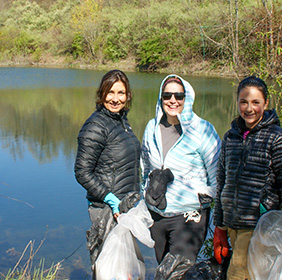Tread lightly, explore naturally
What is “ecotourism” anyway?
There are several variations but we think the definition from The Nature Conservancy best describes it: “Environmentally responsible travel to natural areas, in order to enjoy and appreciate nature (and accompanying cultural features, both past and present) that promote conservation, have a low visitor impact and provide for beneficially active socio-economic involvement of local peoples.”
Nearly everyone wants to do the right thing. Perhaps, they just don’t know what to do. We understand. Knowledge is power which is why we are here to help. Please consider the following information and also visit the sustainable travel section of our website to learn more.
The following outdoor activities are considered a form of low-impact travel on our area’s natural resources:
- Paddle sports – kayaking, canoeing, paddleboarding
- Surfing – wind, water, snow
- Hiking
- Biking
- Photography
- Bird-watching
Being mindful of your environment, as well as, respectful and knowledgeable, are all part of being a good environmental steward.
 Environmental stewardship is the responsibility for environmental quality shared by all those whose actions affect the environment. Below is a list of area groups and/or organizations that have made notable efforts towards being good stewards.
Environmental stewardship is the responsibility for environmental quality shared by all those whose actions affect the environment. Below is a list of area groups and/or organizations that have made notable efforts towards being good stewards.
Grand Haven – Sustainability & Environmental Efforts
Spring Lake – Sustainability Information
Coopersville – Green Pastures Cowshares- Sustainable Agriculture
Allendale – Grand Valley State University – Sustainable Community Development
Aquinas College – Center for Sustainablity
Alliance for the Great Lakes – Adopt-A-Beach
Ottawa County Parks – Voluntourism – Invasive Plant Control
Ottawa Conservation District – Groundwater Stewardship
West Michigan Land Conservancy – Land Stewardship
The links/lists below presents the Endangered (E), Threatened (T), and Probably Extirpated (X) animal/plant species of Michigan, which are protected under the Endangered Species Act of the State of Michigan (Part 365 of PA 451, 1994 Michigan Natural Resources and Environmental Protection Act).
Michigan’s Special Animal List
Michigan’s Special Plant List
Species accounts are available for a number of plant species that have been noted as invasive or having invasive tendencies in Michigan. Some of these are commonly recognized invasive species such as Garlic Mustard, Purple Loosestrife or Phragmites (Giant Reed). Others are emerging threats in Michigan such as Black Jetbead, Swallow-wort, Water Hyacinth or European Frog-bit. A few, such as Hydrilla and Mile-a-Minute, are not yet in the state but are nearby and considered particularly destructive.
Michigan’s Invasive Plant Species Account







